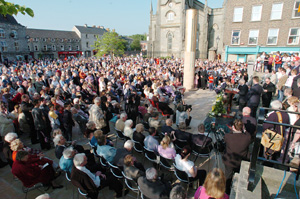20 May 2004 Edition
The forgotten remember
BY JOANNE CORCORAN

Two thousand people filled Church Square in Monaghan for the unveiling of a new memorial to the victims of the 1974 bombing by British agents
Thirty years of anguish resurfaced last Sunday and Monday as the bereaved and survivors of the 1974 Dublin and Monaghan bombings gathered to commemorate the anniversary of the devastating blasts.
At 5.30pm on 17 May 1974, three no-warning car bombs exploded in Dublin city centre at Talbot Street, Parnell Street and South Leinster Street. They were aimed at caused maximum civilian losses, and but for a bus strike that day, many more civilians would have been killed as they stood at the busy bus stops throughout the city.
Ninety minutes later, another car bomb went off in Monaghan Town.
The bombings caused the single largest loss of life during the conflict, officially killing 35 people (baby Martha O' Neill, who was stillborn as a result of the trauma her mother suffered when her father died, was named by Justice Barron as the 35th victim).
The Dublin Government failed to do anything about the bombings at the time. Investigations weren't followed through, no counselling was given, and only miserable amounts of compensation were handed out. Years later, loyalist paramilitaries took the blame for the bombings, but recent investigations by Justice Henry Barron and an Oireachtas Sub-Committee have shown there to be legitimate reasons to suspect collusion on the part of British forces in the atrocities.
Monument unveiled
In Monaghan on Sunday, thousands of people watched the unveiling of a new monument to the victims. Inscribed on the structure are the names of the eight people who died in the town, and a light sparkles over each one.
In Dublin the next day, families and supporters gathered at the memorial on the end of Talbot Street to lay wreaths and flowers. Their heartache was obvious. As Cormac Breathnach played a moving tune on the flute, one woman broke down in tears and was comforted by other family members.
But along with their sorrow, the mourners wanted to express their anger at not being allowed to move on from the atrocities.
Chairperson of Justice for the Forgotten, Bernie McNally, while welcoming the presence of Taoiseach Bertie Ahern, urged him to put pressure on the British Government to find out who was responsible for the bombs. She reiterated the group's demands for a public inquiry, presided over by a judge who would have access to all evidence in both the Irish and British jurisdictions.
Sinn Féin TD Seán Crowe and Councillor Christy Burke attended the commemoration in Dublin. Burke said he remembered the day of the bombings and added that the tragedy had been compounded by years of inaction.
Poignant
This year's commemoration was particularly poignant. It came just a day before the families had to listen to harrowing medical evidence at the ongoing inquests into their loved ones deaths.
Dublin City Coroner Dr Brian Farrell told the hearing there was a good deal of distressing evidence in the medical reports. "We will hear all of the autopsy reports as it is the wish of the families that all of the reports be placed on the public record," he said.
Many of the family members didn't attend the inquest, as a complete list of the wounds each victim suffered from the four-explosions was read out.
The inquest jury finished hearing the autopsy reports on Tuesday evening, and Dr Farrell instructed the jury yesterday on all the evidence they heard during the inquest. The jury is expected to deliver an official finding on the cause of deaths over the next few days.
Speaking on Tuesday, Sinn Féin TD Caoimhghín Ó Caoláin called once again on the Dublin Government to get their act together.
"In this, the week that marks the 30th anniversary of the Dublin and Monaghan bombings, which were carried out by agents of the British Government, there is a need for the Government to act without further delay," Ó Caoláin said.
"Given the intransigence of the British Government on this just demand, the Irish Government need to mobilise international opinion in support of such an inquiry.
Ó Caoláin added: "After 30 years of prevaricating on this issue, the Irish Government owes it to the families of the victims and indeed to the memory of the victims themselves to persist in demanding that a full international public inquiry be carried out. After 30 years, the time for this has well and truly come."



